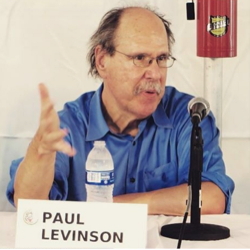
There’s a hectic week ahead. I’ll be driving out to Pittsburgh for the annual Nebula Conference and spending all day on Thursday in a meeting of the SFWA Board making authorial sausage. Please believe me when I tell you it’s not as glamorous as it sounds (and it doesn’t sound glamorous). But it provides a good segue for this week’s EATING AUTHORS because Paul Levinson is a past president of SFWA.
He’s also a classic example of an author who has split his time between academia and fiction, often blurring the line between them. After earning his doctorate back in 1979, Paul bounced around a bit and taught at half a dozen colleges and universities before settling down at Fordham University in New York, where’s he’s been a professor of communications and media studies since 1998.
Both his novels and his nonfiction (a full shelfload of each) explore concepts and themes not just of communications media, but also space exploration, technology, and philosophy. His work has been nominated multiple times for the Hugo, the Nebula, the Sturgeon, and still other awards, while The Silk Code brought him a Locus Award for Best First Novel.
But my favorite thing about Paul’s fiction can be found in his book The Plot to Save Socrates, a time travel novel that opens with a character in the future reading an unknown Socratic dialogue in which the philosopher is given the chance to escape his own death and flee to the future. How could you not love that?

LMS: Welcome, Paul. What meal stands out most in your memory?
PL: It’s tough to say what my favorite meal has been, because my wife Tina and I love to dine out, and the New York City area — not to mention Cape Cod, where we spend a good deal of every summer — have a plethora of possibilities.
But certainly among the contenders would be the Greek Paella I had at MP Taverna, a short walk from the Hudson River in Irvington, New York. Tina read about the restaurant online, and was attracted to it because its chef was (and still is) Michael Psilakis, who she had seen and admired on the Food Channel.
Shelled seafood is far and away my favorite kind of protein, so the Greek Paella was a natural choice for me. I started with a dried fruit salad, with greens, smoked almonds, red onion, manouri cheese, and dried dates, cherries, and kinds of other delicious things. The paella came with orzo — which had been simmering in a deep, fragment melange — and lamb sausage (I usually prefer milder to red hot spices, and the sausage was perfect). The seafood itself was just mouth-watering, especially the succulent langostino and the tangy, splash-on-your-tongue clams, which are two of my favorite sea creatures anyway, and they were prepared to perfection in this dish. For dessert, the grilled watermelon topped with feta was fabulous. (Grilling brings out the sweetness in a way that will surprise you, and the grilled pineapple, which I had on one of our other sojourns to Taverna, is outstanding, too).
Michael Psilakis wasn’t in that night, but I wanted to thank him, and I did that in a way that authors have been known to do. I was completing my novel, Chronica, in that summer of 2014 – third novel in the Sierra Waters time-travel trilogy, which starts with The Plot to Save Socrates and continues with Unburning Alexandria — and I gave Psilakis a cameo as a time-traveling chef at the Millennium Club, which plays a major role in these novels. Food does, too, so putting in Psilakis felt like clicking in a little piece in an almost completed puzzle.
And, as a fate would have it, the paperback edition of Chronica was just published a few weeks ago, so I’m especially happy to be writing about Michael Psilakis and his fine MP Taverna today.

Thanks, Paul. You know, given how much I write about food and alien chefs, I should slip in an homage to some of the real worlds I’ve enjoyed. What a great idea!
Next Monday: Another author and another meal!
#SFWApro
Tags: Eating Authors

